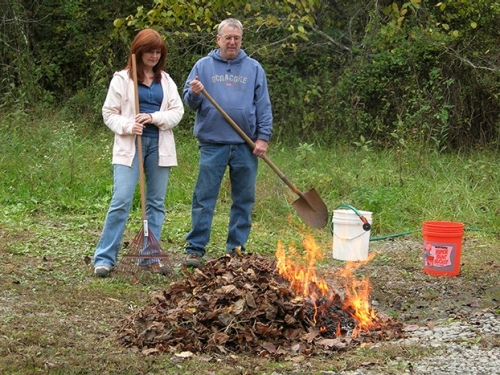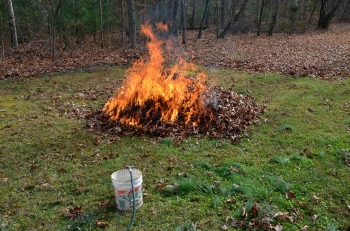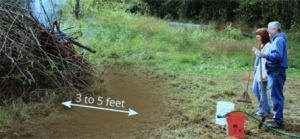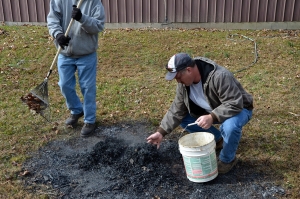Get A Permit Over the Phone
Permits for small debris piles should be obtained through online permit system (Click). Online permits are free and easy to get the day of your burn as long as the division is issuing permits in that location (permits may be restricted due to unsafe burning conditions).
Hours:
Burning permits may be obtained by phone Monday through Friday from 8:00 a.m. to 4:30 p.m. (local time), except on holidays. Permits may be obtained in advance for weekends and holidays.
Get A Permit
Burning permits focus attention on the safe use of fire. From October 15 through May 15, anyone starting an open-air fire within 500 feet of a forest, grassland, or woodland must by law secure a burning permit from the Division of Forestry. Permits are not required for burning in containers such as a metal barrel with a ½" mesh screen cover. Anyone needing to burn within an incorporated city should contact city authorities about any local burning ordinances.

Details
Permits from the Division of Forestry are free of charge and may be obtained online for leaf and brush piles. For larger applications, such as forestry, agricultural, or land clearing operations, call the Division of Forestry phone number for the county where the burning will be done. Links to the online application system and phone numbers are below.
Permits will not be issued on days and in locations if it is considered unsafe to conduct a debris burn.
Please note: Restricting burn permit issuance is not a burn ban. Burn bans can only be proclaimed by the Commissioner of Agriculture, in consultation with the state forester and county mayors on a county basis, or by the Governor, generally on a regional or statewide basis. Such bans carry more significant punishments when violated than burning without a permit. Such bans also prohibit other forms of open-air burning such as cooking fires and campfires.
For information on what materials may NOT be burned in Tennessee, please see below or visit Tennessee Department of Environment and Conservation's Open Burning Guidelines by clicking here. To report illegal burning, please call toll-free 1-888-891-TDEC
Follow these simple tips to conduct a
SAFE DEBRIS BURN

3. Have an available supply of water and hand tools such as rakes and shovels nearby in case your fire should get away. Mechanized equipment may be necessary to contain fires when weather and fuel conditions make control difficult.
4. Rake or plow a firebreak around the area you want to burn. Firebreaks should be clean of vegetation and wide enough to contain flames and flying embers. When burning piles the firebreak must be wide enough to catch rolling debris. The taller the vegetation the wider the firebreak should be.

It should expose a swath of bare ground at least 3 feet wide through leaves or short grass. It should be at least 5 feet wide through tall grass or brush.
Generally, burning permits are not issued on dry, windy days. Even if you have a permit, you should stop burning if a strong wind comes up. Winds may not only carry burning embers into surrounding vegetation but also fan the flames making the fire difficult to control.
6. Control YOUR fire. Your fire is your responsibility! You may be liable for any damages your fire and smoke cause to other people’s property!
Be sure you have enough help. Don’t try to burn more than you can handle by yourself. Keep debris piles small, gradually adding to the fires as they burn down. Large piles of burning debris generate intense heat capable of carrying relatively heavy embers up and across control lines.
Select a burn location away from overhanging tree branches and overhead and underground utility lines. Intense heat from a fire could ignite leaves of trees or cause damage to branches and tree trunks. It could also damage utility
7. Stay with the Fire. Don’t leave your fire until it is completely out and cold, regardless of the time of day. This requirement not only applies to homeowners, but also to contractors conducting debris fires while land clearing. Use plenty of water, douse the embers and mix them with dirt until they are cool and safe. Brush and debris piles can appear to be burned out, but a gust of wind can fan embers causing them to flame or blow across control lines. Within minutes a calm situation can become a wildfire!

Learn Before You Burn
Alert Tennesseans know burning trash outdoors is:
- harmful to the air we breathe
- unhealthy for our neighbors – near and far
- unsafe
- often unnecessary
What Not to Burn in Tennessee:
- Tires and other rubber products
- Vinyl siding and vinyl shingles
- Plastics and other synthetic materials
- Paper products, cardboard and newspaper
- Asphalt shingles, and other asphalt roofing materials and demolition debris
- Asbestos-containing materials
- Paints, household and agricultural chemicals
- Aerosol cans and food cans
- Building material and construction debris
- Buildings and mobile homes
- Coated wire
- Household trash
- Most vegetation not grown on site
It may be okay to burn leaves, branches, tree limbs, twigs, lawn clippings, woody vegetation, yard trimmings, clean unpainted, uncoated wood or untreated lumber. Check your local and/or other state ordinances. Improper out-door burning can lead to fines up to $25,000.
This is the Law in Tennessee.
Alert Tennesseans know there are other options instead of outdoor burning:
- Recycling
- Composting
Help reduce air pollution in Tennessee by avoiding outdoor burning.
